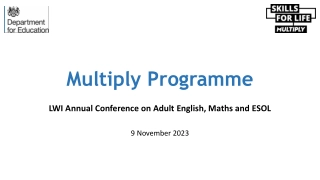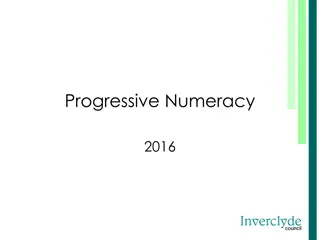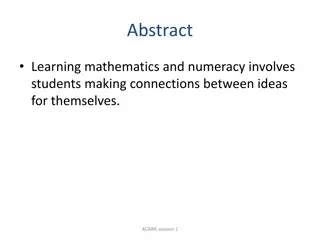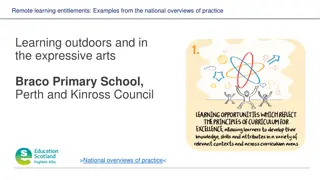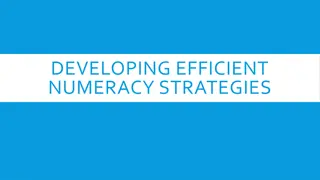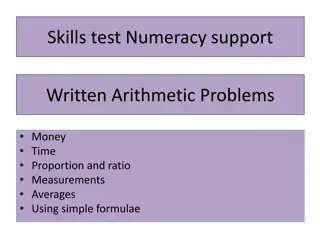Unveiling the Numeracy Challenge in the UK: Session Insights
Delve into the crucial Session 1 of "Becoming a Numeracy Champion" and uncover the depth of numeracy issues in the UK, understanding its impact on individuals and workplaces, addressing math anxiety, promoting positive learning attitudes, embracing everyday numeracy value, debunking prevailing myths, and empowering learners. Gain essential knowledge and skills to support colleagues in enhancing their numeracy proficiency and confidence. Explore the initiatives of National Numeracy, an independent charity, working towards improving numeracy skills across the UK. Elevate your awareness and strategies to foster a numerate society.
Download Presentation

Please find below an Image/Link to download the presentation.
The content on the website is provided AS IS for your information and personal use only. It may not be sold, licensed, or shared on other websites without obtaining consent from the author. Download presentation by click this link. If you encounter any issues during the download, it is possible that the publisher has removed the file from their server.
E N D
Presentation Transcript
Becoming a Numeracy Champion Session 1
Housekeeping Keep microphones on mute unless speaking Change your name to be first name + surname using the three dots next to your name The session is being recorded Where possible, please have your camera on In breakout rooms, nominate one person to feed back to the main room Raise hand to ask or answer questions
National Numeracy Independent charity established in 2012 Our vision is for everyone in the UK to get on with numbers so they can get on with life. We aim to enable everyone across the UK to be confident and competent in using numbers and data, to be able to make good decisions in their daily life and work. We are working towards our aim in two main ways: Raising awareness about poor numeracy levels which exist in the UK, how numeracy differs from mathematics and promoting the recognition that everyone can improve. Improving numeracy. Over 350,000 people have registered to check and improve their maths skills with the National Numeracy Challenge, giving them space to assess and improve on their numeracy at their own pace.
Programme Objective To give you the knowledge and skills to support colleagues to improve their skills and confidence with numbers.
Session 1 Objectives Understand the extent of the numeracy issue in the UK and the reasons for it Describe how poor numeracy affects individuals and workplace s Describe what maths anxiety is and how it affects individuals Understand a positive attitudinal approach to maths learning for low confidence adults Understand the value of numeracy in everyday lives Understand myths that prevail around maths and feel more confident to encourage learners to think differently about them
Numeracy issue in the UK 49% 78% of adults have the numeracy skills expected of children at primary school of adults are working below Level 2 ( C/4 at GCSE)
Numeracy issue in the UK Adults with skills equivalent to C/4 or above at GCSE in England: 60 57% 50 40 44% 30 20 26% 22% 10 0 Literacy Numeracy 2003 2011 Source: Department for Business Innovation and Skills. 2012. The 2011 Skills for Life Survey: A Survey of Literacy, Numeracy and ICT Levels in England.
Numeracy issue in the UK Not confident at work People without the skills and confidence they need in maths Hiding stress and anxieties Pipeline is blocked preventing staff moving to Functional Skills Only a very small proportion of those who need help are currently reached by Numeracy qualifications (138,170 in 2020/21). Staff upskilling through Functional Skills
Numeracy issue in the UK Further Progression Routes Functional Skills Pathway to progression unlocked by improved confidence and overcoming maths anxiety 1. Address maths anxiety 2. Understand Value, Belief and Persistence 3. Gain the Essentials of Numeracy 78% below L2 Only currently accessed by a small proportion of the workforce Low confidence Maths anxiety
Economical Cost Costing billions to the UK each year 20.2b 1.3% of GDP 8.2b Government Figure excludes health and criminal justice costs 8.8b Individuals Individuals earn less when they are less numerate 3.2b Employers 68% of UK employers are concerned about employees ability to sense-check numbers
Curriculum Issue We take GCSE as evidence that they have good numeracy, but once they are in the job the cracks start to appear The school curricula tends to centre on a wide range of increasingly abstract mathematics, often covered at a superficial level. There is rarely time to devote to the kind of practical problem ('relatively simple maths in complex real-world situations') that often arises in healthcare settings. The job description comes in and they ask what qualifications they ve got - but do we pay enough attention to whether literacy and numeracy is included in that? Or do we assume? In a project with social science students at universities, who had at least GCSE grade C, only 26% of those assessed had the Essentials of Numeracy. The Essentials of Numeracy for Healthcare (2018)
Culture around Numeracy Age is just a number. And maths was never my thing.
Culture around Numeracy In the clip, a soundbite was used and lip-synced to by the father- daughter duo, who appeared to say 'I don't know what's going on and I simply don't want to know.'
Culture around Numeracy GCSE students are SO glad it is over and they will never have to do maths again. 15 and 16 year olds up and down the country are celebrating (hopefully) never having to do maths again
Impact of poor numeracy on individuals Reduced employment prospects Inability to progress in some careers Poor productivity Low confidence and self-esteem Poor financial capability Impacts on home life
Impact of poor numeracy on workplaces Recruitment and retention Staff progression Efficiency and productivity Staff wellbeing and confidence at work
Maths Anxiety Maths anxiety has been defined by Tobias and Weissbrod (1980) as, the panic, helplessness, paralysis, and mental disorganisation that arises among some people when they are required to solve a mathematical problem. Research by the University of Cambridge has found that, many children and adults experience feelings of anxiety, apprehension, tension or discomfort when confronted by a maths problem.
What causes maths anxiety? Negative experiences at school Feeling under pressure Fear of failure Being told you re not a maths person Lack of support Dyscalculia
What does maths anxiety look like? Feeling panicked or stressed Feeling flustered or struggling to concentrate Frustration and shutting down or going blank Physical symptoms Avoiding situations which involve maths
Maths anxiety: real perspectives It makes me feel silly. I'm scared of being judged if I m wrong. It reminds me of being told off in school. I m clamming up just thinking about it Cathy, Bradford Even the thought of it would dry my mouth and make my palms sweaty. I remember the first day of school with everyone reciting their times tables and thinking, I don t know what s going on , feeling totally lost and frozen on the spot. On a test I got 1/100, which I hate even talking about Stacey, Chichester
Tips to overcome maths anxiety Talk about your feelings about maths Challenge your own beliefs Try not to compare yourself to others Reduce pressure Set realistic goals
What is dyscalculia? Dyscalculia is an unexpected and persistent learning difficulty that makes it hard to understand, learn, or use maths. Often described as dyslexia with numbers it is much less well-known than dyslexia. Dyscalculia makes learning arithmetic much more difficult, such as recognising numbers, using sequences, counting backwards, estimating and understanding place value.
How does dyscalculia affect your life? Dyscalculia can slow down academic progress and career progression and may cause strong anxiety about maths. Day-to-day effects may include trouble with: Recalling PIN or telephone numbers Managing time Planning journeys Following directions Telling if one amount is greater than another Understanding distances
Real life experiences I was diagnosed with mild dyscalculia at school and have always struggled with maths, so I know what it s like to lack number confidence. But when I started talking and writing about personal finance in my 20s, I realised just how important it is to be unafraid of numbers if you want to manage your money well on a day-to-day basis. Iona Bain, National Numeracy Ambassador
What support is available for dyscalculia? Information and support are available from The Dyscalculia Network You can arrange to be assessed for dyscalculia by contacting the British Dyslexia Association Whether you have dyscalculia, maths anxiety or lack confidence with numbers, you can improve as an adult. Improvement may be slower and specialist support may be needed.
Value Think of a task you regularly do at work. Map out the numeracy involved in your chosen task. Managing staff rotas Knowledge of safe staffing levels Understanding contracted hours Factoring in breaks Taking annual leave into account
Growth Mindset Everyone can improve their numeracy; ability is not fixed. Growth Mindset Fixed Mindset Ability is not fixed. Talent is innate. You can learn and improve at anything if you put enough time and effort into it. Some people just can t do certain things: they need to accept that and find something else they can do. If you put your mind to it you will be able to improve: ability isn t something you re born with. There is no point in trying to improve if you aren t born with ability.
Impact of a fixed mindset If a learner has a fixed mindset and experiences a setback . I can t do this and I ll never get it. Psychological interpretation Decreased effort and greater use of negative strategies Behavioural response Decreased engagement and performance Learning outcome
Impact of a growth mindset If a learner has a growth mindset and experiences the same setback . I need to find a different way to do this and try again. Psychological interpretation Increased effort and use of positive strategies Behavioural response Increased engagement and performance Learning outcome
Persistence Think of something, other than maths, that you have struggled with. How did this make you feel? What steps did you take to overcome the difficulties? Why didn t you give up?
Establishing a habit Keep in mind why you want to improve your numeracy and how it will benefit you Keep it small a little bit every day Anchor your new habit to an established routine Be consistent, not perfect











